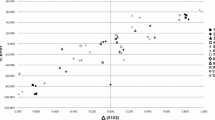Abstract
Averaged n-Dependence Estimators (AnDE) is a family of learning algorithms that range from low variance coupled with high bias through to high variance coupled with low bias. The asymptotic error of the lowest bias variant is the Bayes optimal. The AnDE family of algorithms have a training time that is linear with respect to the training examples, learn in a single pass through the data, support incremental learning, handle missing values directly and are robust in the face of noise. These characteristics make the algorithms particularly well suited to learning from large data. However, for higher orders of n they are very computationally demanding. This paper presents data structures and algorithms developed to reduce both memory and time for training and classification. These enhancements have enabled the evaluation and comparison of A3DE’s effectiveness. The results provide further support for the hypothesis that as the number of training examples increases, decreasing error will be attained by members of the AnDE family with increasing levels of n.
Access this chapter
Tax calculation will be finalised at checkout
Purchases are for personal use only
Preview
Unable to display preview. Download preview PDF.
Similar content being viewed by others
References
Blake, C.L., Merz, C.J.: UCI Repository of Machine Learning Databases, http://www.ics.uci.edu/~mlearn/MLRepository.html
Boyer, B.: Robust Java benchmarking (2008), http://www.ibm.com/developerworks/java/library/j-benchmark1.html
Brain, D., Webb, G.I.: The Need for Low Bias Algorithms in Classification Learning From Large Data Sets. In: Elomaa, T., Mannila, H., Toivonen, H. (eds.) PKDD 2002. LNCS (LNAI), vol. 2431, pp. 62–73. Springer, Heidelberg (2002)
Coffey, N.: Classmexer agent, http://www.javamex.com/classmexer/
Fayyad, U., Irani, K.: Multi-interval discretization of continuous-valued attributes for classification learning. In: Proc. of the 13th Int. Joint Conference on Artificial Intelligence, pp. 1022–1029. Morgan Kaufmann (1993)
Hui, B., Yang, Y., Webb, G.I.: Anytime classification for a pool of instances. Machine Learning 77(1), 61–102 (2009)
Keogh, E., Pazzani, M.: Learning augmented Bayesian classifiers: A comparison of distribution-based and classification-based approaches. In: Proc. of the International Workshop on Artificial Intelligence and Statistics, pp. 225–230 (1999)
Webb, G.I.: Multiboosting: A technique for combining boosting and wagging. Machine Learning 40(2), 159–196 (2000)
Webb, G.I., Boughton, J., Wang, Z.: Not so naive Bayes: Aggregating one-dependence estimators. Machine Learning 58(1), 5–24 (2005)
Webb, G.I., Boughton, J., Zheng, F., Ting, K.M., Salem, H.: Learning by extrapolation from marginal to full-multivariate probability distributions: Decreasingly naive Bayesian classification. Machine Learning 86(2), 233–272 (2012), doi:10.1007/s10994-011-5263-6
Witten, I., Frank, E.: Data Mining: Practical Machine Learning Tools and Techniques. Morgan Kaufmann (2005)
Zheng, F., Webb, G.I.: A comparative study of semi-naive bayes methods in classification learning. In: Simoff, S.J., Williams, G.J., Galloway, J., Kolyshakina, I. (eds.) Proc. of the 4th Australasian Data Mining Conference (AusDM 2005), pp. 141–156 (2005)
Zheng, Z., Webb, G.I.: Lazy learning of Bayesian rules. Machine Learning 41(1), 53–84 (2000)
Author information
Authors and Affiliations
Editor information
Editors and Affiliations
Rights and permissions
Copyright information
© 2012 Springer-Verlag Berlin Heidelberg
About this paper
Cite this paper
Salem, H., Suraweera, P., Webb, G.I., Boughton, J.R. (2012). Techniques for Efficient Learning without Search. In: Tan, PN., Chawla, S., Ho, C.K., Bailey, J. (eds) Advances in Knowledge Discovery and Data Mining. PAKDD 2012. Lecture Notes in Computer Science(), vol 7301. Springer, Berlin, Heidelberg. https://doi.org/10.1007/978-3-642-30217-6_5
Download citation
DOI: https://doi.org/10.1007/978-3-642-30217-6_5
Publisher Name: Springer, Berlin, Heidelberg
Print ISBN: 978-3-642-30216-9
Online ISBN: 978-3-642-30217-6
eBook Packages: Computer ScienceComputer Science (R0)




